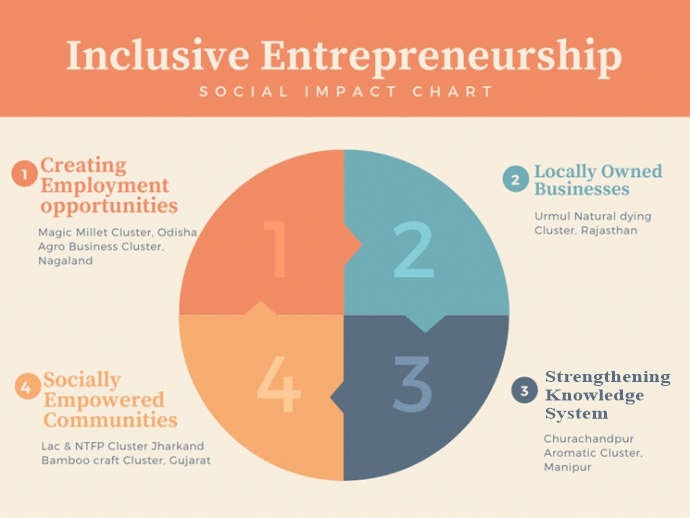SFURTI Clusters: Ecosystem Development for Inclusive Entrepreneurship
Living
in the 21st century, with all kinds of developments and technological
advancements, the issue of poverty and socio-economic disparity still
sustains. Even though employment generation initiatives get incorporated on
an everyday basis, how far are these jobs sustainable and dignified at the
same time? Maybe itís time to look into the idea of entrepreneurship from a
different lens.

Inclusive Entrepreneurship when induced in businesses not only facilitates economic growth but also creates change agents at the grass root level giving shape to more socially empowered communities and creating sustainable livelihoods.
Entrepreneurship in rural communities when seen as a bottom-up, systemic approach initiates socio-economic benefits such as a sense of ownership among communities and local collaboration, thereby building more resilient communities. A generative cycle is set into motion through higher earnings, social equity and improved and dignified livelihoods. An inclusive entrepreneurship approach especially offers all people an equal opportunity to create sustainable businesses, regardless of their background, age or gender. This can be crucial in order to ensure social and environmental sustainability. Hence, the holistic approach keeps in mind progress towards Sustainable Development Goals (SDGs) at its core.

Platforms for inclusive entrepreneurship create economic opportunity for the rural populace especially farmers and artisans, enabling distributed ownership to producers themselves. An ideal example of which is Scheme of Fund for Regeneration of Traditional Industries (SFURTI). SFURTI facilitates financial support by bringing stakeholders on one platform for development of entrepreneurship clusters. The fund is a part of the Indian Micro Enterprises Development Foundation (IMEDF), the social enterprise development vehicle of the Development Alternatives Group initiated as a Nodal Agency under the Ministry of MSME, Govt. of India.
IMEDF develops clusters in diverse sectors like Handloom & Handicrafts, Medicinal Plants, NTFP sector, Artifacts sector, Natural Dye sector, Gold and Services sector. Towards these goals of supporting entrepreneurship clusters, a Special Purpose Vehicle (SPV) is incorporated at the community level. The SFURTI Cluster ensures local participation and decision-making within these SPVís with 33% community members like farmers and artisans. As members of the SPV, community members engage with each other constructively, building inclusion, empowerment and collaboration among them.
SFURTI, a holistically designed fund in essence
takes forward the mission of inclusive entrepreneurship:

-
It facilitates social & women empowerment in tribal belts of Gujarat and Jharkhand where women have taken the onus of livelihood generation.
-
Promotes green technologies and innovations for enhanced production processes and contributes to environment friendly footprint.
-
Facilitates economic growth and development by creating sustained employment opportunities for decent livelihoods.
-
Strengthens knowledge systems through technical training and imparting soft skills: Soft inventions in these rural clusters are enhancing financial literacy, technical and entrepreneur skills of artisans and other stakeholders.
To sum up, a step towards inclusive
entrepreneurship not only requires enthusiastic and entrepreneurial
individuals but also incorporations at the policy level that promotes
entrepreneurship. The aim is to create an ecosystem of opportunities that
covers diverse population groups, transferring skills and providing
financial support especially in the rural communities. For this, behavioural
change amongst decision makers at the higher level is necessary to push for
inclusive schemes especially at the grassroots. The fact that an initiative
like SFURTI is taken by the Indian government for the promotion of
traditional industries and local entrepreneurship shows promise of deepening
impact, empowerment and growth in the future.
■
Col. Raman
Thapar
cthapar@devalt.org
Yashika
yashika@devalt.org